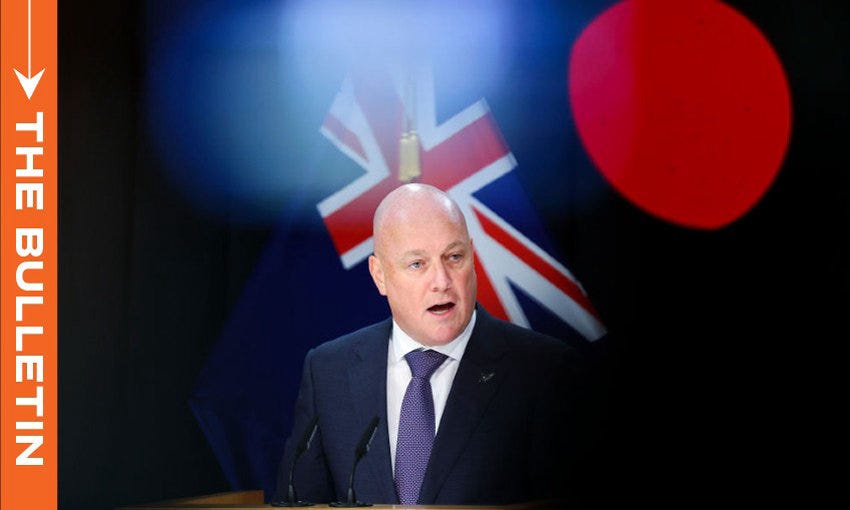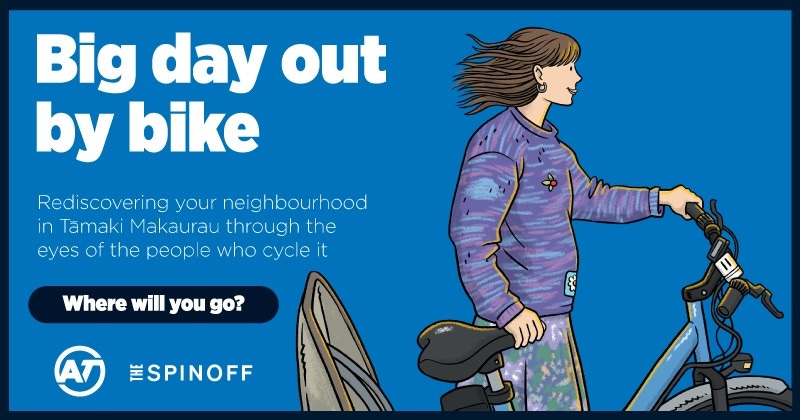Christopher Luxon's simple message for councils: get back to basics
'Rein in the fantasies' and ditch the 'white elephants'.
Mōrena, and welcome to The Bulletin for Thursday, August 22.
In today’s edition: A major report exposes bias in the police, how can New Zealand solve its energy crisis, and Jacinda Ardern immerses herself in US politics. But first, the prime minister issues a tough and somewhat unwelcome message for local councils.
Groans and applause
Christopher Luxon has delivered a stern message to local councils: tighten your belts and get back to delivering the basics. The prime minister received a somewhat frosty reception at the Local Government New Zealand conference in Wellington yesterday, reported Stuff’s Glenn McConnell, with “groans, but also a smattering of applause” as he took aim at council spending. His biggest target was the council of the region he was speaking in – Wellington – including criticising the venue that the conference was being hosted in. “With pipes bursting and other infrastructure under pressure, Wellington City Council decided to spend $180 million of ratepayers’ money on a convention centre, which, according to public reporting, is now losing money,” the prime minister said.
Ditch the ‘white elephants’
As the Herald’s Georgina Campbell pointed out, the Tākina Convention Centre was actually developed at a time when Wellington’s struggling infrastructure wasn’t in the limelight. Nevertheless, the prime minister had a perfect visual aid to accompany his imagery of creaking infrastructure: a burst water main had flooded a nearby road earlier in the day. Luxon didn’t hold back during his address, urging councils to “rein in the fantasies” and ditch the “white elephants”. Several attendees at the conference publicly condemned the PM’s speech, Campbell reported, including Wellington mayor Tory Whanau who said Luxon had “punched down”. On Twitter, Green Party regional councillor Thomas Nash called Luxon’s address “one of the most mana diminishing, paternalistic and visionless speeches to a group of people I have ever heard”.
Luxon didn’t just come with strong words. There was also proposal, reported the Herald’s Thomas Coughlan, that would restrict the ability of councils to hike rates to pay for non-core spending. Local government minister Simeon Brown said the proposal, which may involve a regulator, had worked in New South Wales. But there’s little detail about what would be considered non-core spending, noted The Post’s Thomas Manch, speculating it could mean cycle ways or just “anything the government deems unworthy”.
The localism debate
All of this sounds a little bit like the government butting into local politics, something which National in opposition was highly critical of. Luxon, speaking to media after his speech, pushed back on that, reported The Post’s Thomas Manch. Councils have a responsibility not to do “dumb stuff”, said the prime minister. “We are big fans of localism and devolution, but with that doesn't mean we just send cash to the local communities and we get nothing for it in return. We expect a return on that investment.” But as The Spinoff’s Joel MacManus argued earlier this year, since entering government, National has quickly developed a shaky track record when it comes to embracing localism. Ditching Auckland’s regional fuel tax is one such example, with mayor Wayne Brown effectively demanding central government stop interfering in the city he’s in charge of. “This is my city, not theirs,” Brown said. As we discussed earlier in the year, the government also scrapped proposed reforms for the future of local government. On Twitter, Labour’s Kieran McAnulty called Luxon’s latest remarks “cynical”.
Moving forward, the government has shown support for securing cross-party consensus on “city deals” – which, as MacManus explained, “typically involve a long term contract between central government and councils, empowering councils to take on major infrastructure or other projects in exchange for a greater share of the tax take”.
Support for Māori wards
Wellington’s mayor Tory Whanau also took aim at the government for getting involved in the workings of local government when addressing the issue of Māori wards. Under a new law put forward by the government, councils will be required to hold a public referendum at the next local election if they wish to keep or bring in a Māori ward. The Spinoff’s Shanti Mathias explained the intricacies of that proposal earlier in the year. As Waatea News reported, there were protests outside the venue yesterday in support of Māori wards, while inside, council leaders themselves voiced support for having choice. “Councils should decide for themselves on the use of Māori wards,” Whanau said yesterday. Local Democracy’s Susan Botting reported that more than 80% of councils at the meeting endorsed a push against the government’s new legislation led by the Palmerston North council.
Show your support, join up today!
"As a New Zealander living in Sydney, The Spinoff helps me to feel in touch with what's happening back home. There's a great breadth to the content – and the enthusiasm from your contributors is palpable. I feel happy and proud to be a member." Ian, Sydney.
Whether living here or abroad, if you value our work please show your support by becoming a member today.
Major report exposes bias in the police
Being Māori increased the chance of being prosecuted by 11%, a new review into police bias has concluded, while Māori represented 42% of those tasered despite being about 18% of the population. The Herald’s Julia Gabel reported on the key findings of the three-year study, which also concluded that police could be influenced by stereotypes when making decisions and being in a gang increased the chance of prosecution. Writing for The Spinoff this morning, Anjum Rahman commended the police for being involved in the review process but said that addressing its findings, particularly those which require systemic change, will take careful planning. “These changes require more than just support from police leadership: they require political will,” writes Rahman. “A desire to do the hard mahi of ensuring a fair and equitable policing infrastructure, that will sit in a fair and equitable society.”
Meanwhile, police revealed yesterday that cost-cutting measures could mean more than 170 people lose their jobs. Commissioner Andrew Coster stressed these would not be frontline positions.
Who has the solution for our energy crisis?
New Zealand is heading for an energy crisis, if it’s not already in one, and the regional development minister has issued a warning for the Electricity Authority: “This is not a time for a pedestrian approach… I really want them to man up and use their authority, or they’ll end up as roadkill.” As the Herald’s Adam Pearce reported, Jones met with authority management where he demanded “instant results” to rein in profits by energy generation companies. It follows the announcement that businesses like Winstone Pulp intend to close mills in response to surging energy prices. But the minister in charge of the sector, Simeon Brown, denied the government was considering scrapping the authority and advocated instead for market competition. Writing for Politik this morning (paywalled), Richard Harman explained the differing positions between the coalition partners on how to solve the crisis, noting that it could point to “short-term Covid-style subsidies as a solution”.
Big day out by bike: flat whites, friends and fixing things
“If I want to go fast I can go fast, If I want to go slow, I can go slow."
One keen cyclist, and her 3-year-old son, round up their favourite weekend bike ride in Tāmaki Makaurau. It offers water views, cafe pit stops, places to meet up with friends and mostly sticks to cycle lanes. Check out their big (but chill) day out by bike, here. (sponsored)
Click and Collect
RNZ’s Guyon Espiner’s latest investigation reveals a leaked lobbying plan from tobacco giant Philip Morris that shows they got what they wished for.
The Spinoff’s Joel MacManus wants to know who killed Johnsonville’s shopping centre.
We talked earlier in the week about the PM’s latest rebuke of the proposed Treaty Principles Bill. Now, reports RNZ’s Jo Moir, Winston Peters has muddied the waters.
The government has placed the failed Du Val property development group into statutory management. (BusinessDesk, paywalled)
For something different: I enjoyed this piece in The Atlantic about autonomous vehicles and a gripping video of a parking lot in San Francisco.
A review of New Zealand’s sanctions regime against Russia is underway, reports Sam Sachdeva for Newsroom Pro. (paywalled)
On a brand new Gone by Lunchtime: Crown-Māori relations remain top of the agenda as the PM enjoys an encouraging boost in popularity.
“Nobody’s interested until it wins an award”: Louise and Gareth Ward join The Spinoff Bookseller Confessional. The labour market is leaving young people behind, writes Diana Russell, and that’s a problem for all of us. Nick Iles reveals the remarkable pie shop hidden in a Porirua industrial estate. And Dylan Reeve writes about his soul-destroying attempt to report scam Facebook ads.
Pop culture picks, with Alex Casey
Some must reads from the world of entertainment from our resident expert.
I missed this when it first came out, but I loved this long read about what the race to recap Game of Thrones did to the media and the people working within it. "I had to unpack that a bit and address that and start getting my priorities in order. It was just a TV show." Too real!!!!
If you are in the South Island like me, your New Zealand International Film Festival journey is just getting started! Check out our picks from previous cities if you are stumped as to what to book in for (I'm very excited for Sasquatch Sunset and the return of Heavenly Creatures to the big screen).
I've scrambled to get my head around the current Blake Lively backlash, which is in part due to her weirdly cutesy promotion for a film about domestic violence, and this extremely rude start to a 2016 interview. Amazingly petty timing from the interviewer to drop it amidst the controversy :O)
That’s it for this morning, thanks for reading. I’ll be back tomorrow.
Want to get in touch? Join the conversation in the Substack comments section or via email at thebulletin@thespinoff.co.nz if you have any feedback on today’s top stories (or anything else in the news).
If you liked what you read today, share The Bulletin with friends, family and colleagues.

















Given this government’s track record of cuts to the public service (where so-called “back office” functions will indubitably affect the “front line”) and the PM’s comments describing the arts as a ‘nice to have’ in our schools, Luxon’s comments to councils are terrifying. What does he and his ilk regard as not-basic for councils? Playgrounds? Libraries? Local climate action? As a father of 4, I’m genuinely concerned about this current Government’s total disregard for people who aren’t wealthy.
Spinoff's endless quoting of his/her fellow journalists adds a new but unwelcome dimension to reportage. Journalists are hardly the most respected workpersons this side of the black stump.